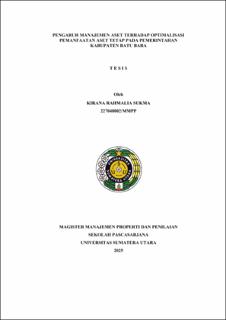| dc.description.abstract | The governance of Indonesia has changed significantly after the 1988's Reformation, especially with the enactment of Law No. 22 of 1999 on Local Government, which marked the beginning of the decentralization of authority from the center to the regions. This enactment was followed up by Law No. 32 of 2004 which emphasized the obligation of local governments to regulate their own affairs with the principle of autonomy. A series of regional property management activities includes asset inventory, legal asset audit, asset valuation, asset supervision and control, and asset optimization. This research examines on optimizing the utilization of fixed assets in Batu Bara regency government. The research population consists of 99 employees distributed across 35 work units, from which a sample of 79 respondents is selected to represent it. Data obtained are analysed using Partial Least Square (PLS) by distributing questionnaires to 79 respondents. The results indicate that the inventory of assets has no significant effect on the optimization of fixed assets, while the legal asset audit and asset valuation have a positive and significant effect. Asset supervision and control can moderate the effect of asset inventory on the optimization of fixed assets, but does not significantly moderate the effects of legal audit and asset valuation. The variable that strengthens asset optimization based on the research result is asset valuation. Asset valuation proves to be the most influential factor in optimizing fixed assets, as it provides accurate value information, supports resource allocation planning, and strategic decision making. An objective, independent, and regulatory assessment ensures optimal utilization of assets, including in the maintenance, disposition and improvement of asset management efficiency. | en_US |


